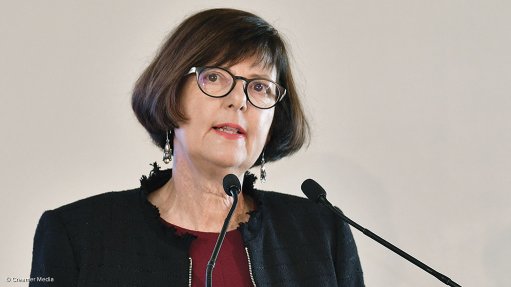
South Africa’s environment Minister Barbara Creecy
Photo by: Creamer Media Chief Photographer Donna Slater
South Africa’s environment Minister Barbara Creecy has criticised the lack of progress, since COP26, in the area of climate finance support for developing countries, arguing that there has been a failure to promote “adequate ambition”.
Speaking at the Petersberg Climate Dialogue in Berlin, Germany, Creecy said it was time to tackle climate finance with the sense of urgency and scale it deserved.
Quoting the United Nations Framework Convention on Climate Change standing committee on finance, Creecy highlighted that developing countries needed between $5- and $11-trillion to meet their climate objectives. However, an Organisation for Economic Cooperation and Development report shows that only about $80-billion has been mobilised.
“The only way we can re-establish credibility in financial provision is to set a realistic goal for developed countries to mobilise at least $1-trillion per annum to assist developing countries meet their climate change objectives,” Creecy said at the dialogue, which is being held as part of preparations for the COP27 talks, scheduled for Sharm El-Sheikh, Egypt, in November.
Creecy also lamented the lack of progress in relation to discussions on loss and damage, adaptation, and the just transition, which she said remained trapped in process-related discussions.
“We can only avoid loss and minimise damage with the appropriate scale of public finance that does not exacerbate the indebtedness of Africa.”
The Minister reported that South Africa was accelerating its own climate actions, with a Climate Bill currently before Parliament, which would lay the regulatory framework for the implementation of the country’s climate commitments.
A Just Transition Framework had also been finalised with the support of the Presidential Climate Commission, which would “form the basis for our long-term climate action”.
“To this end, we have set up a Task Team to develop an investment plan for the Just Energy Transition Partnership, or ‘JETP’, announced in Glasgow, with our partner countries – Germany, France, the UK, the US and the European Union (EU).”
A JETP Investment Plan is currently being finalised ahead of COP27 and it is anticipated that some projects may even receive funding support ahead of the event.
COAL BACKSLIDING
Creecy also used the dialogue to slam those developed countries that were “reverting back to coal in response to their negative national circumstances”, particularly after some developing countries were “vilified” at COP26 for stressing their national circumstances in relation to the continued use of fossil fuels.
“Developed countries must continue taking the lead with ambitious action.
“The ultimate measure of climate leadership is not what countries do in times of comfort and convenience, but what they do in times of challenge and controversy.”
A number of European countries are pushing ahead with plans to temporarily increase the use of coal, oil and even nuclear to mitigate Russian moves to limit gas supply in response to sanctions imposed following its military invasion of Ukraine.
In fact, the International Energy Agency (IEA) argued in a statement that such increases could help to minimise gas use in the power sector, which is one of five steps that the agency said should be taken by European countries to “avoid a major gas crunch this winter”.
The other four interventions proposed, included: introducing auction platforms to incentivise EU gas users to reduce demand; enhancing coordination among gas and electricity operators across Europe, including on peak-shaving industrial mechanisms; bringing down household electricity demand by setting cooling standards and controls; and harmonising emergency planning across the EU at the national and European level.
“If these types of measures are not implemented now, Europe will be in an extremely vulnerable position and could well face much more drastic cuts and curtailments later on,” the IEA warned.